 |
|
Post D
Some Experiences of an Air
Raid Warden
by
John Strachey
|
|
 |
|
This is
the 1941 First Edition
“The
reader will be disappointed if he seeks for a record of
heroic deeds or thrilling escapes in these pages. Many
people undoubtedly did courageous things in the course
of the bombing of London, and other English cities,
during the autumn of 1940. But, as it happens, I never
had the good fortune to witness any deeds of individual
heroism. And I had the good fortune not to experience
any thrilling escapes. It may be, however, that just
because of this the description here attempted will be
found to be, on the whole, representative of what many
Air Raid Wardens, and other Civil Defence workers, saw
and heard during this period. Such experiences were
unusual, from a peace-time standpoint, and it seemed
worth while to try to set them down while they were
still fresh in the memory . . .” [From the Preface]
|
|
 |
 |
|
|
|
Publisher and place of
publication |
|
Dimensions in inches (to
the nearest quarter-inch) |
|
London: Victor Gollancz Ltd |
|
4¾ inches wide x 7½ inches tall |
| |
|
|
|
Edition |
|
Length |
|
1941 First Edition |
|
135 pages |
| |
|
|
|
Condition of covers |
|
Internal condition |
|
Original blue cloth blocked in black. The
covers are rubbed, more noticeably around the edges, and with some variation
in colour. The spine has faded and is a little dull, while there is a faint
imprint of the price and Gollancz logo from the dust-jacket . The spine ends and
corners are bumped. There is a slight forward spine lean. |
|
This volume is ex-Library: there is a
bookplate on the front pastedown ("The John Crow Collection Library of the
University of Kent at Canterbury") which is hidden by the dust-jacket flap
and a "Withdrawn" stamp on the front free end-paper, plus a
stamped number on the reverse of the Title-Page, but no other Library
markings and the text is clean throughout. The War-time paper has tanned
with age and The edge of the text block is dust-stained. |
| |
|
|
|
Dust-jacket present? |
|
Other
comments |
|
Yes: however, the dust-jacket is scuffed,
rubbed and creased around the edges, with a number of minor tears at either
end of the spine panel and the flap-folds. The thin paper dust-jacket also
has a number of grubby marks and is quite discoloured overall. There is a
patch on the spine panel where a label has been removed. The images
below give a good indication of the current state of the dust-jacket. |
|
Despite being ex-Library, the markings are
confined to a bookplate which is hidden by the dust-jacket flap and a
"Withdrawn" stamp on the front free end-paper, plus a stamped
number; otherwise, this is a clean example of the First Edition, in the dust-jacket. |
| |
|
|
|
Illustrations,
maps, etc |
|
Contents |
|
NONE : No illustrations are called
for |
|
Please see below for details |
| |
|
|
|
Post & shipping
information |
|
Payment options |
|
The packed weight is approximately
400 grams.
Full shipping/postage information is
provided in a panel
at the end of this listing.
 |
|
Payment options
:-
UK buyers: cheque (in
GBP), debit card, credit card (Visa, MasterCard but
not Amex), PayPal
-
International buyers: credit card
(Visa, MasterCard but not Amex), PayPal
Full payment information is provided in a
panel at the end of this listing. |
|
|
 |
|
  |
|
 |
 |
|
Post D : Some Experiences of
an Air Raid Warden
Contents
Preface
I. Introduction to the Blitz
II. First Incident
III. Digging for Mrs. Miller
IV. The Landing Window
V. Spokonia Noch
VI. Incendiaries
VII. Goddam and Frontier Incident
VIII. The Big Bomb
IX. A Brush with the Borough
X. Make Haste, Hitler
|
|
 |
 |
|
Post D : Some Experiences of
an Air Raid Warden
Excerpts:
I. Introduction to the Blitz
The line was interrupted beyond Wimbledon. Just before they got
there the sirens went, and immediately out of the train windows they
saw the raiders, the size of small moths, flying south. These moths
flew on undisturbed for perhaps thirty seconds: then they were beset
by tiny gnats, diving down on them and curling up at them from
beneath. The air battle was too high for there to be any sound of
machine-gun fire. Both the raiding bombers and the defending
fighters left graceful white trails of condensation across the sky,
so that for several minutes after they had passed out of sight you
could see the pattern of the engagement. There were long, straight
paths made by the bombers, parallel at first, then tending to
diverge and grow irregular as they were intersected and interlaced
by the short, steeply curved arcs of the dives and zooms of the
fighters.
It was a sky-bound, geometrical and austere sight, with little to
do, one might have thought, with the human beings going about their
business four or five miles below in South-West London.
Ford was on his way back from Surrey. The serious night attacks upon
London had started a week before, on September 7th. But there was
still a certain amount of day raiding going on. At Wimbledon he took
a bus. As soon as they had gone over Putney Bridge the bus left its
normal route and diverged into side turnings. Presently the streets
began to have an unusual look. A good many people were about without
hats; they had evidently just come out of their houses; they were
looking up and down the street. The disturbed ant-hill comparison
inevitably occurred to him. Not that the streets were crowded. But
the people were evidently neither doing anything nor going anywhere
in particular. They were just disturbed. Down a side street Ford saw
a knot of people, some of them in one or other of the Civil Defence
uniforms, round a wrecked house. A little farther on the bus
scrunched over broken glass. Shattered shop windows gave some
streets an eyeless look.
Ford asked the conductor if the bus would get back on to its normal
route. The conductor said, "I've no idea." As they seemed to be
diverging farther and farther Ford got out and began walking home.
He passed two more newly wrecked houses, upon which rescue or other
work was going on. He turned down James Street, a nondescript sort
of street that he never remembered having walked down before. It
took him into Gage Street, which he walked along into Marlow Square.
Two or three Air Raid Wardens were walking about rather busily at
the far end of the Square. Where his own street, St. Hilda's
Terrace, began he found a rope barrier. As he came up to it two
wardens stopped him. "You can't go past," they said in chorus.
"Unexploded bombs in Bedford Court." Ford immediately felt
determined to go to his house. He said, "But my house is only two
doors down. It's really in Marlow Square. Surely I can go there."
"Quite impossible," said one of the wardens.
"But I must get a toothbrush."
"Do you want to risk your life for a toothbrush?" said a lady
warden.
Ford said, "Who wouldn't?"
His facetiousness was not encouraged. Another warden came up. Ford
recognised a Miss Sterling. Miss Sterling,
he vaguely knew, was "his" warden, in the sense that she lived only
a dozen doors away, and had come round once or twice to enquire
whether they had a stirrup pump, if their gas masks were in order,
and so on. He appealed to her. "Oh, Miss Sterling, I only want to go
home just for a minute to get some things."
The other wardens repeated, "Quite impossible."
Ford thought of the two old ladies who lived in the basement and
"did for him".
"But what about Miss Team and Miss Aird?" he said. "Have they been
evacuated yet?"
Miss Sterling said, "They haven't gone yet."
"Then it's perfectly absurd," he replied. "Of course I must go back
and help them to pack, and to get my own things." Without waiting
for a refusal he stepped over the rope barrier. As he went he heard
the other two wardens blaming Miss Sterling for letting him go.
At home the two old ladies were packing in a fluster. "Oh, Mr. John,
we've got to be out in three minutes. Wherever shall we go—whatever
shall we do?"
Ford said, "We'll find somewhere for you."
Just then the sirens went again. Miss Aird dropped the string bag
into which she was stuffing a half-eaten joint. Her hands fluttered.
They began to hear gunfire.
Ford went upstairs and began throwing clothes into two big
suitcases. He hadn't finished when the front-door bell rang. He
opened it and found Miss Sterling standing on the doorstep. She was
not facing him, but was looking, with a detached expression, down
the street towards Bedford Court. She said, "Mr. Ford"—she spoke
very slowly—"Mr. Ford—I don't think—I don't think—there are any D.A.
bombs at all."
Ford was considerably puzzled. He said, "Don't we have to go, then?"
"I don't think so."

III. Digging for Mrs. Miller
The little Marlow Square incident began a period of considerable
strain. No further bombs came down in their sector, but each night
there were heavy raids, in which many bombs fell within the borough.
At two o'clock one morning the telephone bell rang. Ford had just
come down from the landing, and was about to wake Levy. He answered
the telephone and heard Mrs. Raymond's correctly official voice.
"Post D speaking. Control has informed us that an exceptionally
large number of incidents are reported as taking place in Slaney.
All Chelsea wardens are instructed to be in readiness to report
there for duty."
Ford went upstairs and duly informed Miss Sterling and Miss
Dalrymple, who were on watch, of this message. There did not seem
much to do or say about it. So he went to bed and to sleep. He woke
to find Miss Sterling shining a torch on him. She said: "Post D has
rung through to say that you are to go to Slaney F at 8 a.m. They
have more incidents than they can cope with."
He disentangled his slept-in clothes from the blankets and mattress
on the basement floor of the sub-post. He swilled water over his
face, finding it cold out of the hot tap. Apparently the gas had
gone again in the night. He took a bus down the Queen's Road to the
next A.R.P. district, Slaney. When he got to the Slaney F Post the
Senior Warden was out; fetched, he hesitated between various tasks.
Then Rumbold, another Post D warden, came. Finally they were both
told to go down to Beaton Street.
A bomb, or bombs, had hit the last five houses in Beaton Street,
where it joins the river, and a small tenement that forms the last
block on the embankment. (Ford supposed that these were some of the
incidents which Post D had reported during the night. Curiously
enough no one at 46 had heard the detonations.) These buildings had
been destroyed Where they had stood there was a crater, with two
mounds of debris on each side of it, one some twenty-five feet, and
the other some fifteen feet, high. The debris of the five houses and
the tenement was completely mixed in the mounds; there was no trace
of separate structures.
Ford and Rumbold found rescue squads working on each mound. After
wandering about a little they found the warden in charge. He seemed
unable to think of anything he wanted done. "Just keep them from
coming down the streets," he said. He evidently felt vaguely that it
must be right to stop people doing something. But nobody was coming
down the streets. Between ten and twenty oldish men and women, and
one or two untidy girls were standing about in the doors and on the
area steps of the more or less shattered, but still standing, houses
round the incident.
Ford and Rumbold saw no one to stop doing anything; so they just
waited about. It was a squally October morning. As usual on the
embankment, you suddenly became conscious of the weather, almost as
if you had been in the country. The tide was low: gulls stood on the
mud-flats. The wind flickered the surface of the channel. A biggish
collier, looking inappropriate so far up the river, was moored fifty
yards farther on beside the power station. The power station's
chimneys stood over them. People glanced at them, and then at the
mounds.
Ford began watchjng what the rescue squad on the nearest mound was
doing. They had evidently been at work for some hours already. They
had fixed a plank walk up the side of the mound, and a knot of them
was concentrated near the top, apparently moving the debris about
with their hands, and putting bits of it into wicker baskets. When
the baskets were filled they took them to other parts of the mound
and emptied them. It looked aimless. Ford climbed on to the debris
to try to see what they were at. As soon as he got on to the mound
he found that it was made up of an extraordinary texture of brick
and plaster rubble, more or less shattered lengths of floor joists
and beams, pieces of broken furniture, rugs, carpets, linoleum,
curtains, pieces of crockery, often unbroken, all made into a
homogeneous, tight-pressed pudding. It was rather difficult to climb
on to.
When he got to the top he was gradually able to make out what the
rescue squad was doing. They were sinking a small shaft vertically
downwards through the mound from its top. They worked much in the
same way as archaeologists open up the debris of millennia; but this
was the debris of seconds. The rescue men had blue overalls, instead
of the brown overalls of the Chelsea wardens, such as Ford was
wearing. The rescue men took no notice of him. They had only sunk
their shaft about five feet down into the mound. They seemed to him
to be working in an incredibly primitive and inefficient way—with
their bare hands, and without any tools even, let alone any
mechanical appliances.
One of them began to let himself down into the shaft, which was
encumbered by ragged ends of floor joists and beams. He got to the
bottom and then wormed his body round till he was lying in a knot
with his head down by a crack, where some tattered rubble was held
up an inch or so by a joist end. Ford moved to the edge of the shaft
to see. The rescue men stood still, and one of them called down to
the people by the mound to be quiet. Ford heard the river waves lap
the mud. The rescue man down the shaft put his mouth to the crack
and said; "Are you there, chum?" Everybody kept really still. But
they heard nothing. The man down the shaft put his ear to the crack.
The rescue man at the top, who had called to the people to be quiet,
said: "Can't you hear him any more, Smith?" Smith said, "Yes, but
he's getting very faint." Then he began to get out of the shaft. It
was 9.30 a.m. Ford had not realised before that there were people
alive under them in the mound.
The rescue squad went on digging, no faster but steadily, filling
wicker baskets with rubble, passing them from hand to hand to the
edge of the mound and emptying them.
The one who had called down to the people to be quiet said, "Cut
away some of that stuff"—pointing to one edge of the shaft—"the
weight'll be coming down on Smith otherwise." A couple of rescue men
took up shovels and began trying to use them on that edge of the
mound, pushing rubble down into the central crater. Ford felt
restless. He saw a pick lying about, so he took off his coat, put
down his gas mask and torch, and began to loosen the rubble so that
the men with shovels could really get at it. The rescue men neither
warned him off—as he feared they might—nor welcomed him. Rumbold
came and worked with another shovel.
For about a foot down his pick made good progress; it was easy to
loosen the broken brickwork, plaster, and the rest of the
indescribable mixture of which the mound was made. Then his pick
stuck in something tough and sticky. Using all his strength, he got
it out. At the next stroke it stuck again. He got it out.
Forewarned, he made smaller strokes, only attempting to loose tiny
bits of the new material. He wondered what it was. He picked a bit
up in his hands, and recognised it as the clay which is the
universal sub-soil of London. If you dig down, say, ten feet almost
anywhere in London this is what you come to. But he was working more
than ten feet above street level. The bomb had picked up layers of
the sub-soil and somehow spread them above the layers of obliterated
houses.
After some little time the rescue man who had put them on (he was
evidently called Frank) said, "That's enough." Ford was glad. His
arms ached. But he didn't fancy standing about. So he got a place
taking the filled baskets as the men in the shaft passed them out to
be emptied. The rescue men still neither welcomed nor repulsed him.
He could now see that their apparently primitive method of work with
their hands was in fact the only possible way of dealing with the
material of which the mound was made. It would have been quite
impossible to swing a pick or shovel in the shaft, partly because it
was too narrow. But even if they had dug it wider, as soon as you
had got a few feet down a network of half-shattered woodwork would
have prevented the use of any tool which Ford could think of. As it
was, they were continually having to stop to saw through a wedged
joist or beam. They used absurdly small, flimsy saws— they looked as
if they had been bought at toy shops, and perhaps they had—in order
to be able to get them into the corners of the shaft.
They began to smell gas—not poison gas, but ordinary domestic gas.
As the shaft progressively opened up the mound, the shattered pipes
of the houses permeated it with gas. "Nobody must strike a match,"
said Frank. But the rescue men went on smoking just the same.
Every now and then a rescue man would call out "Warden," and Ford or
Rumbold would go over and take charge of some bit of personal
property . . .
|
|
 |
 |
|
Post D : Some Experiences of
an Air Raid Warden
From the dust-jacket:
Mr. Strachey, famous for his
theoretical works, here gives us a very different sort of book —a
description, full of deep human feeling but superbly restrained, of
his experiences as a London air-raid warden. One of the chapters —
Digging for Mrs. Miller —has appeared in the New Statesman,
and this is what the Manchester Guardian wrote of it: " If
any of the hundreds of thousands who have been spared the actual
experience want to know exactly what phrases like 'London can take
it' mean when the worst comes to the worst in the matter of air
raids they can hardly do better than acquaint themselves with Mr.
John Strachey's article 'Digging for Mrs. Miller' in this week's
New Statesman. It describes with extraordinarily vivid
simplicity and restraint, yet with revealing detail of character and
setting in every paragraph, the task of a rescue squad in
recovering, after hours of labour, the bodies of victims buried
under the wreckage and ground soil of five utterly obliterated
Thames-side dwellings. There is no attempt to harrow, no attempt to
moralise —just an apparently effortless piece of inspired reporting
that sets down, almost with a numbed, automatic fidelity, the
picture of the task and its performers. This war has not produced a
more effective piece of writing or one that belongs more inevitably
to the history of our own times. It is to be hoped that it will find
its way to the United States. It is a supplement to anything that
films and official messages can tell about London's ordeal."
|
|
 |
|
  |
 |
|

Please note: to avoid opening the book out, with the
risk of damaging the spine, some of the pages were slightly raised on the
inner edge when being scanned, which has resulted in some blurring to the
text and a
shadow on the inside edge of the final images. Colour reproduction is shown
as accurately as possible but please be aware that some colours
are difficult to scan and may result in a slight variation from
the colour shown below to the actual colour.
In line with eBay guidelines on picture sizes, some of the illustrations may
be shown enlarged for greater detail and clarity.
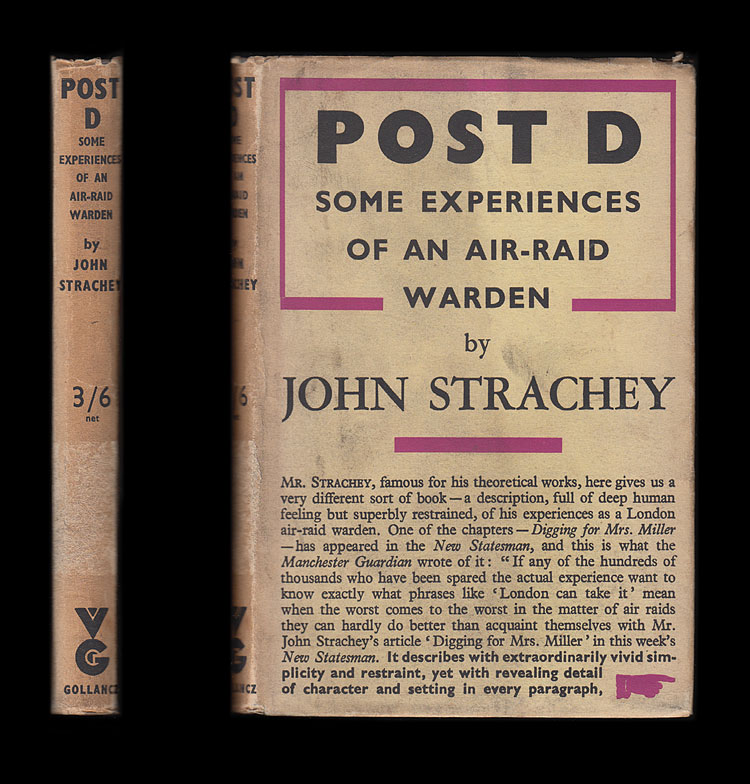
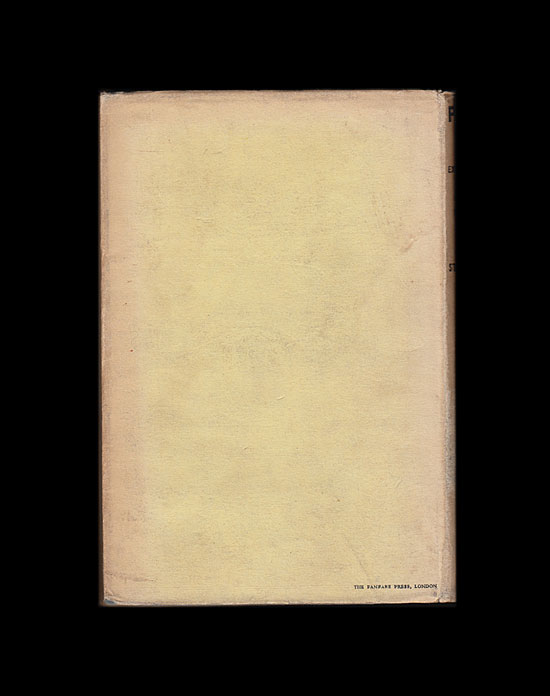
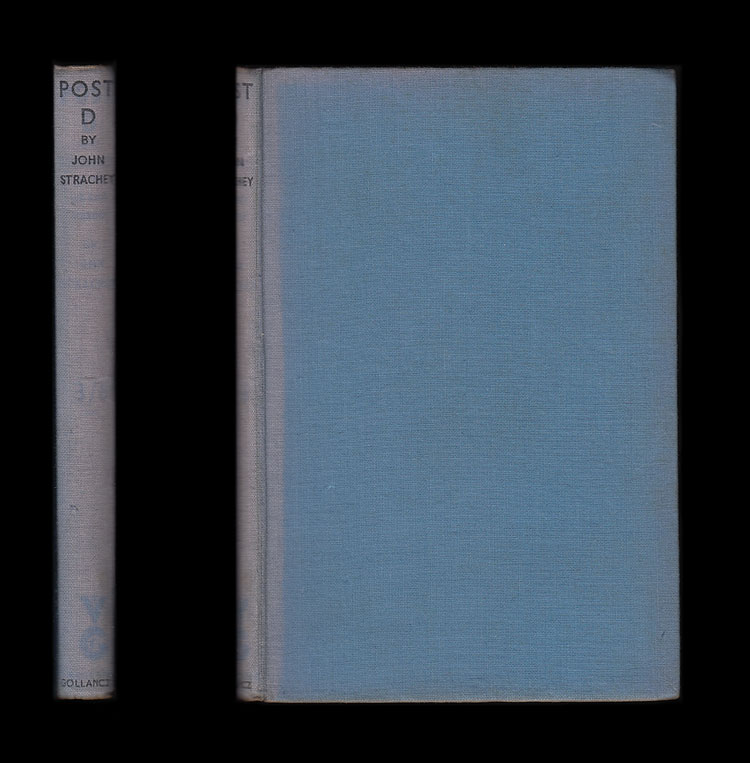

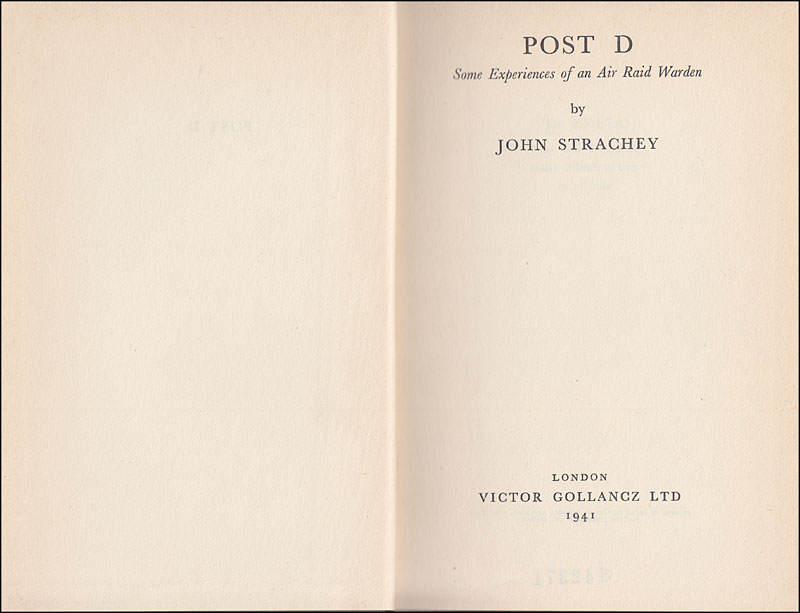
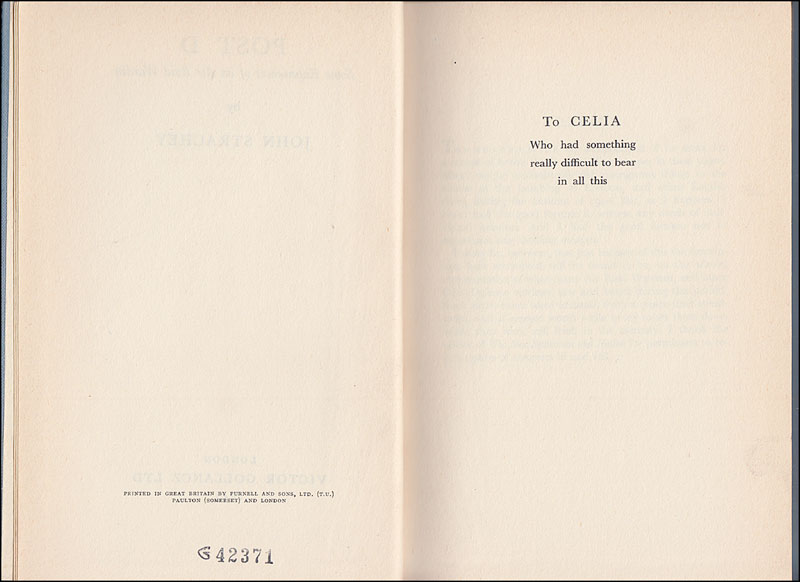
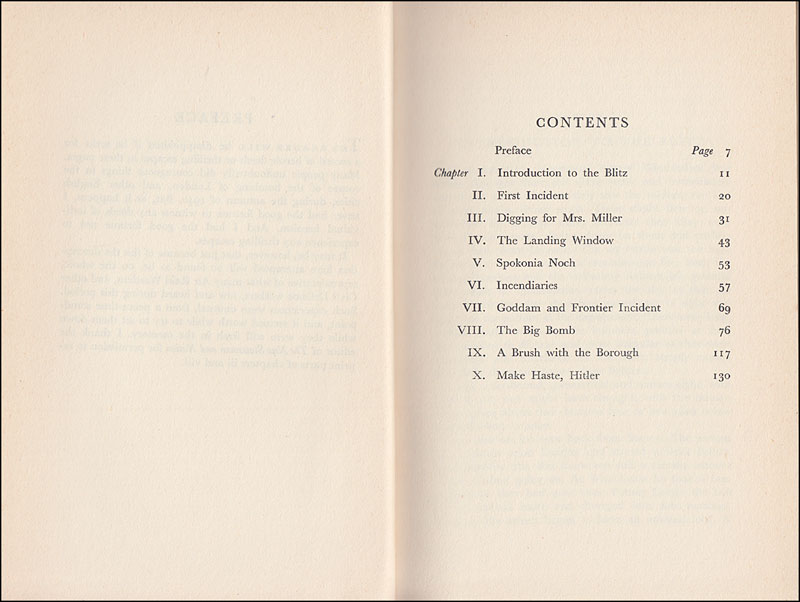
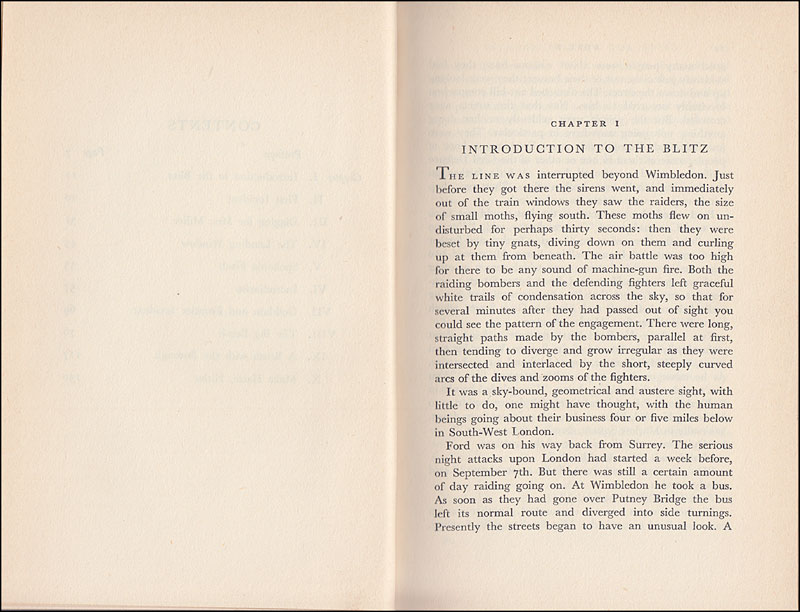
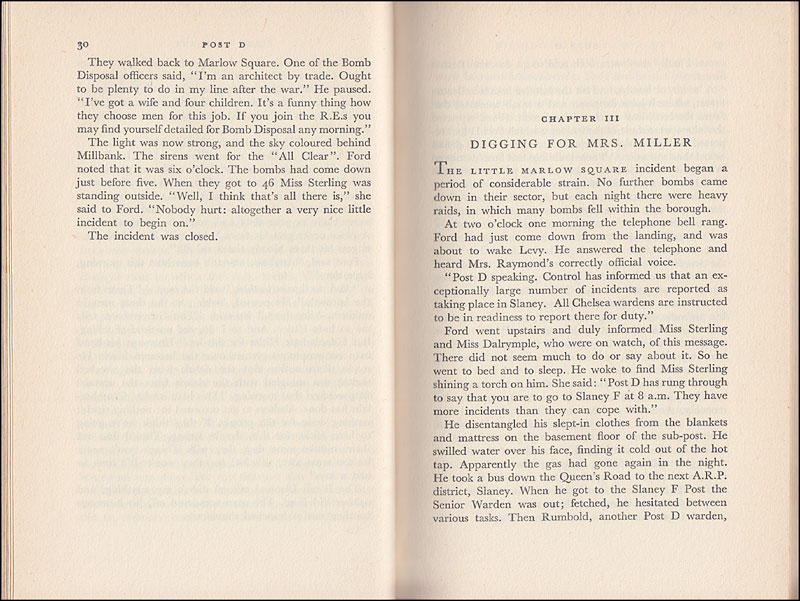
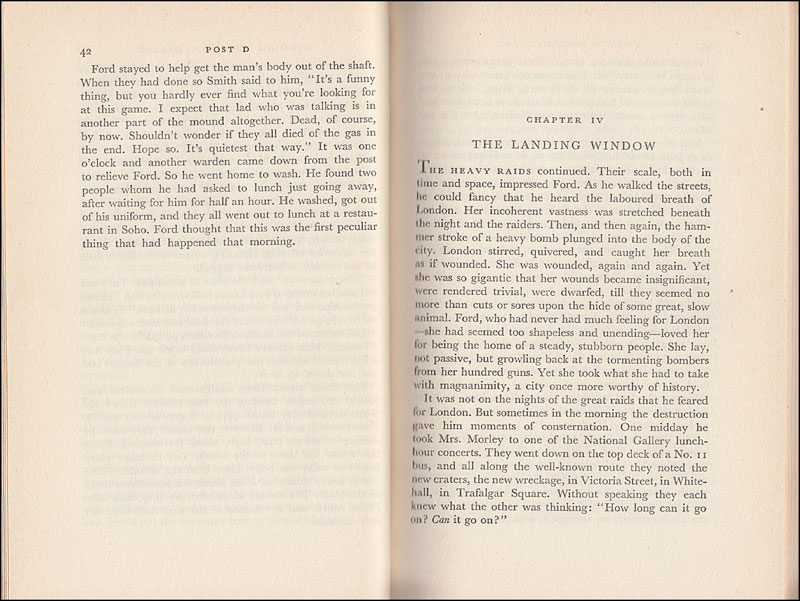
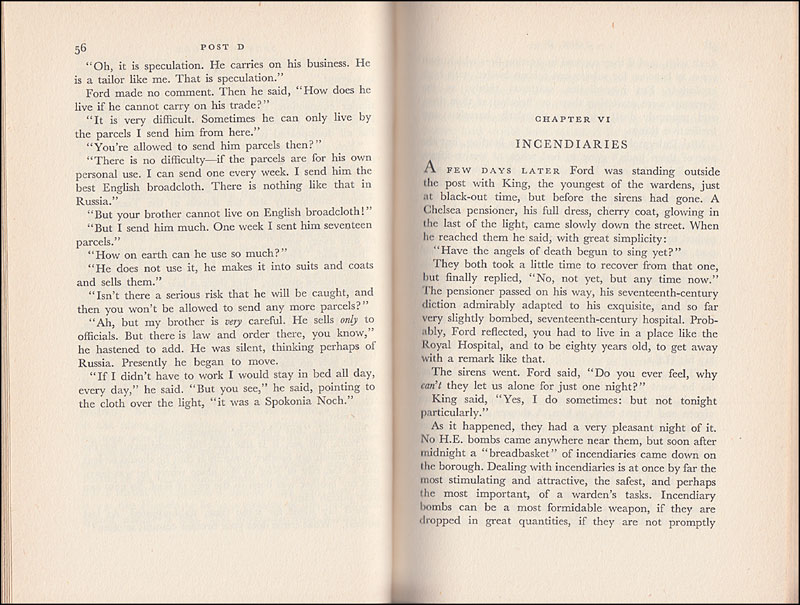
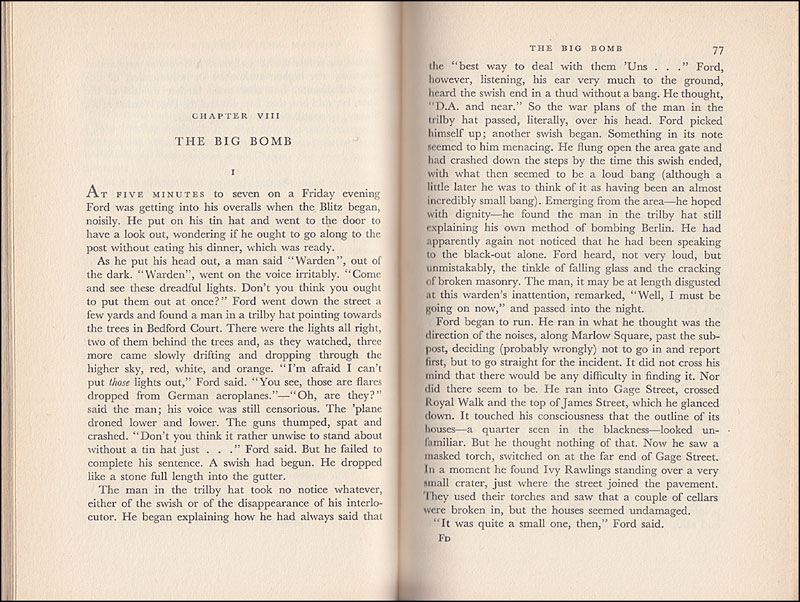
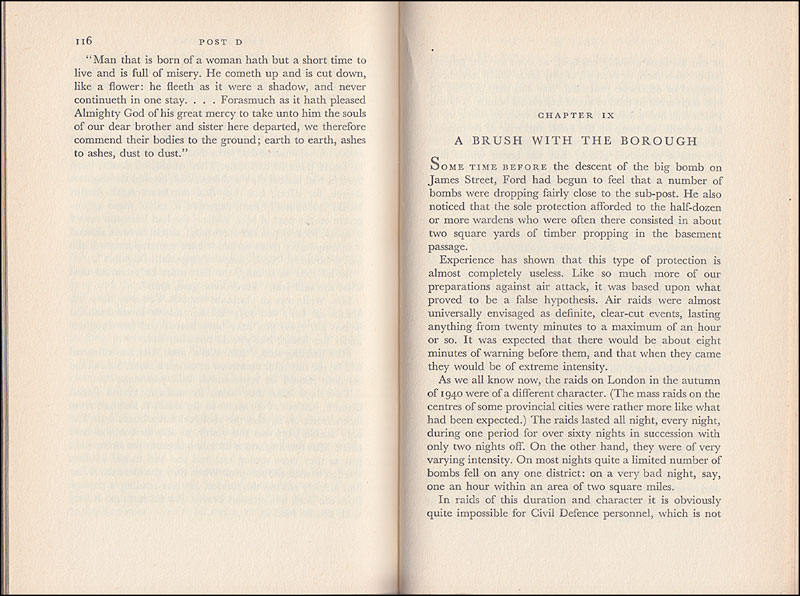
This
volume is ex-Library: there is a bookplate on the
front pastedown ("The John Crow Collection Library of
the University of Kent at Canterbury") which is hidden
by the dust-jacket flap and a "Withdrawn" stamp on the
front free end-paper:
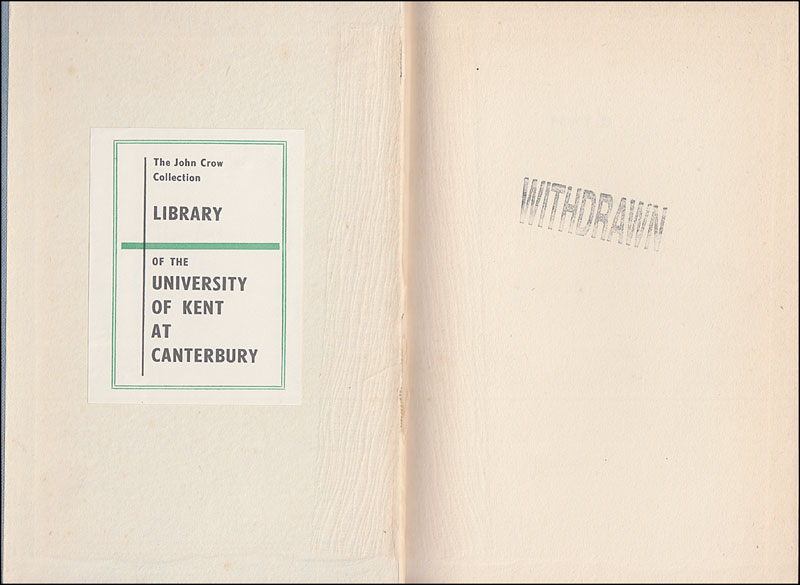 |
|
 |
|
 

IMPORTANT INFORMATION FOR PROSPECTIVE
BUYERS |
 |
|
U.K. buyers:
|
To estimate the
“packed
weight” each book is first weighed and then
an additional amount of 150 grams is added to allow for the packaging
material (all
books are securely wrapped and posted in a cardboard book-mailer).
The weight of the book and packaging is then rounded up to the
nearest hundred grams to arrive at the postage figure. I make no charge for packaging materials and
do not seek to profit
from postage and packaging. Postage can be combined for multiple purchases. |
Packed weight of this item : approximately 400 grams
|
Postage and payment options to U.K. addresses: |
-
Details of the various postage options can be obtained by selecting
the “Postage and payments” option at the head of this
listing (above). -
Payment can be made by: debit card, credit
card (Visa or MasterCard, but not Amex), cheque (payable to
"G Miller", please), or PayPal. -
Please contact me with name,
address and payment details within seven days of the end of the auction;
otherwise I reserve the right to cancel the auction and re-list the item. -
Finally, this should be an enjoyable
experience for both the buyer and seller and I hope you will
find me very easy to deal with. If you have a question or query
about any aspect (postage, payment, delivery options and so on),
please do not hesitate to contact me, using the contact details
provided at the end of this listing.
|
|
 |
 |
|
International
buyers:
|
To estimate the
“packed
weight” each book is first weighed and then
an additional amount of 150 grams is added to allow for the packaging
material (all
books are securely wrapped and posted in a cardboard book-mailer).
The weight of the book and packaging is then rounded up to the
nearest hundred grams to arrive at the shipping figure.
I make no charge for packaging materials and do not
seek to profit
from shipping and handling.
Shipping can
usually be combined for multiple purchases
(to a
maximum
of 5 kilograms in any one parcel with the exception of Canada, where
the limit is 2 kilograms). |
Packed weight of this item : approximately 400 grams
| International Shipping options: |
Details of the postage options
to various countries (via Air Mail) can be obtained by selecting
the “Postage and payments” option at the head of this listing
(above) and then selecting your country of residence from the drop-down
list. For destinations not shown or other requirements, please contact me before buying.
Due to the
extreme length of time now taken for deliveries, surface mail is no longer
a viable option and I am unable to offer it even in the case of heavy items.
I am afraid that I cannot make any exceptions to this rule.
|
Payment options for international buyers: |
-
Payment can be made by: credit card (Visa
or MasterCard, but not Amex) or PayPal. I can also accept a cheque in GBP [British
Pounds Sterling] but only if drawn on a major British bank. -
Regretfully, due to extremely
high conversion charges, I CANNOT accept foreign currency : all payments
must be made in GBP [British Pounds Sterling]. This can be accomplished easily
using a credit card, which I am able to accept as I have a separate,
well-established business, or PayPal. -
Please contact me with your name and address and payment details within
seven days of the end of the auction; otherwise I reserve the right to
cancel the auction and re-list the item. -
Finally, this should be an enjoyable experience for
both the buyer and seller and I hope you will find me very easy to deal
with. If you have a question or query about any aspect (shipping,
payment, delivery options and so on), please do not hesitate to contact
me, using the contact details provided at the end of this listing.
Prospective international
buyers should ensure that they are able to provide credit card details or
pay by PayPal within 7 days from the end of the auction (or inform me that
they will be sending a cheque in GBP drawn on a major British bank). Thank you.
|
|
 |
 |
|

(please note that the
book shown is for illustrative purposes only and forms no part of this
auction)
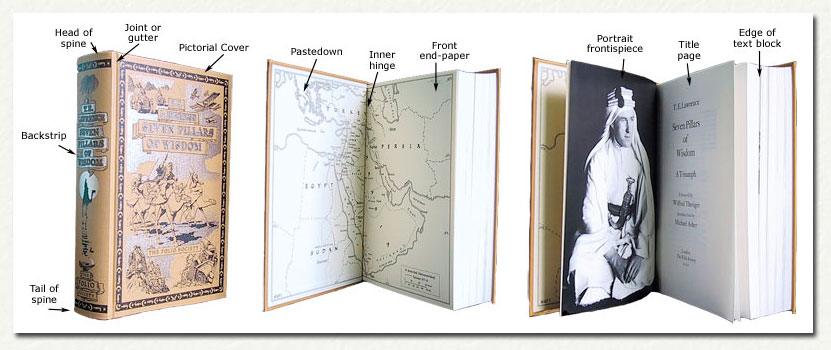
Book dimensions are given in
inches, to the nearest quarter-inch, in the format width x height.
Please
note that, to differentiate them from soft-covers and paperbacks, modern
hardbacks are still invariably described as being ‘cloth’ when they are, in
fact, predominantly bound in paper-covered boards pressed to resemble cloth. |
|
 |
 |
|

Fine Books for Fine Minds |
I value your custom (and my
feedback rating) but I am also a bibliophile : I want books to arrive in the
same condition in which they were dispatched. For this reason, all books are
securely wrapped in tissue and a protective covering and are
then posted in a cardboard container. If any book is
significantly not as
described, I will offer a full refund. Unless the
size of the book precludes this, hardback books with a dust-jacket are
usually provided with a clear film protective cover, while
hardback books without a dust-jacket are usually provided with a rigid clear cover.
The Royal Mail, in my experience, offers an excellent service, but things
can occasionally go wrong.
However, I believe it is my responsibility to guarantee delivery.
If any book is lost or damaged in transit, I will offer a full refund.
Thank you for looking.
|
|
 |
 |
|
Please also
view my other listings for
a range of interesting books
and feel free to contact me if you require any additional information


Design and content © Geoffrey Miller |
|
 |
|
|
|